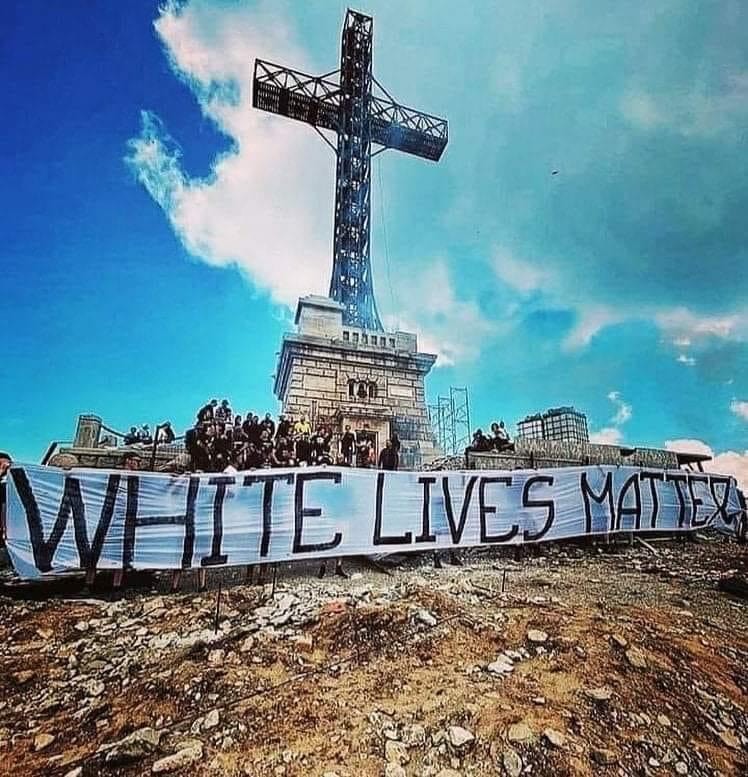
The perhaps much overlooked geographical significance of recent social unrest in the USA related to the Black Lives Matter and various anti-racist and decolonial movements is how quickly they ’scaled up’ globally, sparking sharp debates in Eastern Europe for the first time. Although in the region these movements have been most often dismissed either as an ideological threat or simply irrelevant, still the discussions of colonial and racial memory politics have provoked intriguing questions about comparability. Since the 2010s, authoritarian right-wing regimes of populist nationalisms have constructed an imaginary dividing line between “former colonizer” Western and “non-colonizer” Eastern European countries, expressing fears of becoming Western “colonies” whilst victimizing their ‘peripheral whiteness’ in an identity politics of recognition. Stuck in an uncomfortable ’in-between’ position within global colonialism, Eastern Europeans have historically embraced colonial Europeanness and whiteness whilst excusing from its dark moral burden – ultimately producing contradictory silences in the region’s complicated racial and colonial history. How can we understand this semiperipheral Eastern European relation to global colonialism and racism? How can decolonialism, seemingly relevant only to the imperialist West and the postcolonial Global South, be also relevant to a region which is commonly known as “non-colonizer” and without colonial history? This paper aims to unpack Eastern European ‘frustrated whiteness’ through exploring a decolonial approach to this uneasy and contradictory semiperipheral position in global (post)colonialism.
CULTURE AT A CROSSROAD: WHAT COLLABORATION DO WE WANT IN EASTERN EUROPE?
Friday, September 18th, 2020
12.00 pm – 4.30 pm
Facebook event and live stream
East European Biennale Alliance (EEBA) presents ‘Culture at Crossroads: What Collaboration Do We Want in Eastern Europe?’ – an online symposium which will be streaming on Friday September 18th 2020 from 12 pm (CET). The symposium will be held in English and is organised by the founding members of EEBA – Biennale Warszawa, Bienále Ve věci umění / Matter of Art Praha, OFF-Biennále Budapest a Kyiv Biennial (VCRC).
Participants:
Tereza Stejskalová, Veronika Janatková, Dominika Trapp, Kateřina Smejkalová, Noemi Purkrábková, Zoltán Ginelli, Eszter Lázár, Eszter Szakács, Serge Klymko, Wolfgang Schwärzler, Vasyl Cherepanyn, Aleksandra Jach, Michał Dąbrowski, Bartek Frąckowiak, Marta Michalak
What should we expect from art and art institutions in the next few years or decades? What is their role at a time of a major social transformation? Why do we make or present art, for whom, and does it make sense to continue using the same formats and materials as before? What should art be focusing on and what difference can it make? These are old questions but they need to be asked whenever conditions are changing—and they are changing now, drastically. Without a doubt, the current situation leads us to rethink and reimagine the way art institutions, art practices, and artists operate. We ask these questions from a perspective of artists and curators who operate in the Eastern European region—the periphery of Europe. As we have witnessed again during the COVID-19 pandemic, the interconnected global challenges take specific shape in our region. How are we, the art/cultural sector (institutions, curators, critics, artists, producers) preparing ourselves to operate in the future? How should we rethink the ways of creation, production, and distribution of artworks, projects, and events?
Perhaps, as a consequence of the COVID-19 pandemic, the art world will become smaller, more local, more grounded in local communities. This can be a good thing in terms of the sustainability of both: the human and non-human lives on this planet. After all, the opportunities for artistic and curatorial mobility have never been distributed equally or justly. But the notion of local can also be a trap. Under the rule of conservative governments in our countries, critical art, critical artists and critical art institutions have become extremely precarious, in some cases even directly persecuted. International connections are a crucial resource of not only intellectual exchange and finances but also of moral and political support. In what forms, formats, and mediums will this international cooperation be able to continue? How can we share gestures of solidarity with our Eastern European collaborators, partners, friends, comrades in struggle?
The newly established East Europe Biennial Alliance, comprised of the Biennale Matter of Art in Prague, Biennale Warszawa, Kyiv Biennial, and OFF-Biennale Budapest, aims to propose a different narrative of the East European region and redefining the way cultural institutions collaborate. As contemporary biennials have become an important vehicle reaching new contexts and audiences, the Alliance is designed to enhance the role of biennials in shaping innovative forms of international solidarity, expanding socio-political imagination and elaborating alternative cultural solutions. The Alliance brings biennials together to develop a shared vision and regional collaboration producing cross-border meetings, public events and working on the common agenda for upcoming years.
—
Program
I. TECHNOLOGIES AND THE WORK OF COLLABORATION
12:00-12:10 Tereza Stejskalová & Veronika Janatková: Introduction
12:10-12:25 Kateřina Smejkalová: Action and Interaction in Digital Capitalism
12:25-12:40 Noemi Purkrábková: Crossing the Distance: Hopes & Sorrows of Art and Music in the Virtual Sphere
12:40-12:50 Discussion
12:50-13:00 Break
II. DECOLONIZATION AND/OF COLLABORATION
13:00-13:15 Zoltán Ginelli: Decolonizing the Non-Colonizers? Eastern Europe in Global Colonialism and Semiperipheral Decolonialism
13:15-13:30 Eszter Lázár & Eszter Szakács: Practices of Alliance Building
13:30-13:45 Dominika Trapp: Peasants in Atmosphere
13:45-14:00 Discussion
14:00- 14:30 Lunch
III. ECOLOGIES AND VISUAL POLITICS OF COLLABORATION
14:30-14:45 Aleksandra Jach & Michał Dąbrowski: How to Talk about the Climate Crisis?
14:45-15:00 Wolfgang Schwärzler: Building the East Europe Biennial Alliance’s Graphic Design.
15:15-15:30 Vasyl Cherepanyn & Serhiy Klymko: Political in Content, Visual in Form: Notes on Cultural Internationalism.
15:30-15:45 Bartek Frąckowiak & Marta Michalak: Eastern Europe: Three Scenarios for the Future of Transnational Collaboration in the Cultural Field
15:45-16:15 Discussion
© Zoltán Ginelli
Ginelli Z. (2020): Decolonizing the Non-Colonizers? Eastern Europe in Global Colonialism and Semiperipheral Decolonialism Critical Geographies Blog, 2020.07.03. Link: /2020/07/03/decolonizing-the-non-colonizers